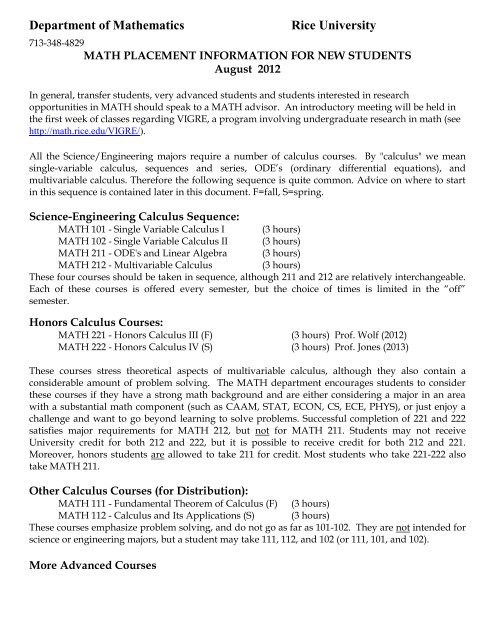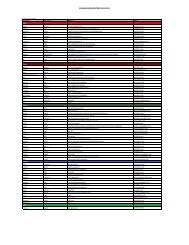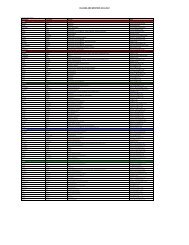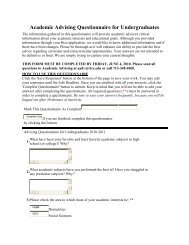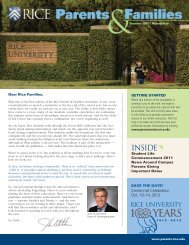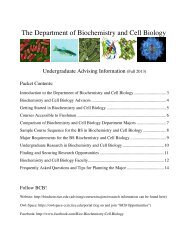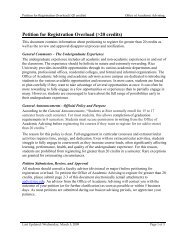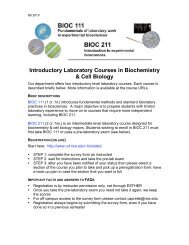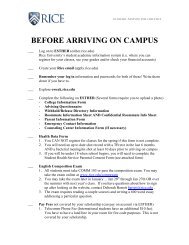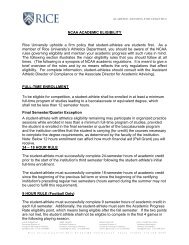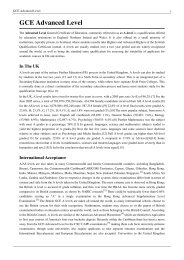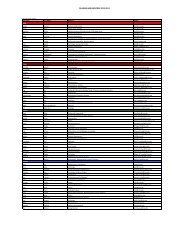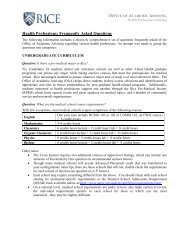Department of Mathematics - Rice University
Department of Mathematics - Rice University
Department of Mathematics - Rice University
Create successful ePaper yourself
Turn your PDF publications into a flip-book with our unique Google optimized e-Paper software.
<strong>Department</strong> <strong>of</strong> <strong>Mathematics</strong><strong>Rice</strong> <strong>University</strong>713-348-4829MATH PLACEMENT INFORMATION FOR NEW STUDENTSAugust 2012In general, transfer students, very advanced students and students interested in researchopportunities in MATH should speak to a MATH advisor. An introductory meeting will be held inthe first week <strong>of</strong> classes regarding VIGRE, a program involving undergraduate research in math (seehttp://math.rice.edu/VIGRE/).All the Science/Engineering majors require a number <strong>of</strong> calculus courses. By "calculus" we meansingle-variable calculus, sequences and series, ODE’s (ordinary differential equations), andmultivariable calculus. Therefore the following sequence is quite common. Advice on where to startin this sequence is contained later in this document. F=fall, S=spring.Science-Engineering Calculus Sequence:MATH 101 - Single Variable Calculus I (3 hours)MATH 102 - Single Variable Calculus II (3 hours)MATH 211 - ODE's and Linear Algebra (3 hours)MATH 212 - Multivariable Calculus(3 hours)These four courses should be taken in sequence, although 211 and 212 are relatively interchangeable.Each <strong>of</strong> these courses is <strong>of</strong>fered every semester, but the choice <strong>of</strong> times is limited in the “<strong>of</strong>f”semester.Honors Calculus Courses:MATH 221 - Honors Calculus III (F) (3 hours) Pr<strong>of</strong>. Wolf (2012)MATH 222 - Honors Calculus IV (S) (3 hours) Pr<strong>of</strong>. Jones (2013)These courses stress theoretical aspects <strong>of</strong> multivariable calculus, although they also contain aconsiderable amount <strong>of</strong> problem solving. The MATH department encourages students to considerthese courses if they have a strong math background and are either considering a major in an areawith a substantial math component (such as CAAM, STAT, ECON, CS, ECE, PHYS), or just enjoy achallenge and want to go beyond learning to solve problems. Successful completion <strong>of</strong> 221 and 222satisfies major requirements for MATH 212, but not for MATH 211. Students may not receive<strong>University</strong> credit for both 212 and 222, but it is possible to receive credit for both 212 and 221.Moreover, honors students are allowed to take 211 for credit. Most students who take 221-222 alsotake MATH 211.Other Calculus Courses (for Distribution):MATH 111 - Fundamental Theorem <strong>of</strong> Calculus (F) (3 hours)MATH 112 - Calculus and Its Applications (S) (3 hours)These courses emphasize problem solving, and do not go as far as 101-102. They are not intended forscience or engineering majors, but a student may take 111, 112, and 102 (or 111, 101, and 102).More Advanced Courses
Students who have already taken some or all <strong>of</strong> the above courses should also consider the followingcourses. For even more courses see the general announcements. Speaking to a MATH advisor may bethe best way to decide which course to take.MATH 300 Basic Concepts in the Theory <strong>of</strong>Dynamical Systems (F) Pr<strong>of</strong>. Damjanovic (2012)MATH 321 Intro. to Analysis I (F) Pr<strong>of</strong>. Semmes (2012)MATH 354 Honors Linear Algebra (F) Pr<strong>of</strong>. Cochran (2012)MATH 355 Linear Algebra (F) Dr. Tweedy (2012)MATH 365 Number Theory (F) Pr<strong>of</strong>. Boshernitzan (2012)Students who have taken multivariable calculus or differential equations should consider MATH 354if they are interested in abstract math and might possibly be a MATH major or double major. Thiswould serve as a first class wherein one is trained in and required to prove mathematical statements.If you are a first-year student, you should obtain permission <strong>of</strong> Pr<strong>of</strong>. Cochran to enroll in Math 354.MATH 365 can play a similar role. You must obtain consent <strong>of</strong> Pr<strong>of</strong>. Semmes in order to enroll in 321.Registration:It is quite important that you enroll in the course for which you are best suited in light <strong>of</strong> yourprevious calculus instruction. There are several guiding principles you may find helpful. We areconvinced that most science-engineering freshmen should skip at least MATH 101.1. Basic principle: If you want to take calculus, you should enroll in a course asadvanced as you can possibly handle. If you find you are in over your head, youmay easily drop down to a more elementary course. (A transition in the otherdirection is obviously much more difficult to manage.)2. No calculus background at all: You should begin with MATH 101 or 111.3. Advanced placement credit:a. Grade <strong>of</strong> 4 or 5 on AB test. You have credit for MATH 101 and youmay start with MATH 102.b. Grade <strong>of</strong> 4 or 5 on BC test: You have credit for MATH 101-102 and youmay start with MATH 211 or 212. You should consider MATH 221 if youlove math.4. No advanced placement credit: You may have taken some calculus, however,and probably should enroll in a course beyond MATH 101. Consult with a<strong>Mathematics</strong> pr<strong>of</strong>essor for advice.5. Transfer credit from another university: Consult with Pr<strong>of</strong>. Jones for advice.6. Have taken Multivariable calculus (but might not have credit): Talk to a MATHadvisor. You should strongly consider MATH 221-222 (see the discussion on thefirst page).Tentative Texts (2012):MATH 101-102-111: Stewart, Calculus Early Transcendentals, Custom PrintMATH 211: Polking, Boggess & Arnold, Differential Equations, 2 nd Ed.MATH 212: Marsden & Tromba, Vector Calculus, 5 th Ed.MATH 221: Purchase book from Pr<strong>of</strong>. Jones.MATH 300: Devaney, Intro. to Dynamical Systems, 2 nd Ed.
MATH 321: Rudin, Principles <strong>of</strong> Mathematical Analysis, 3 rd Ed.MATH 354: Friedberg, Insel & Spence, Linear Algebra, 4 th Ed.MATH 355: Leon, Linear Algebra with Applications, 8 th Ed.MATH 365: Niven, Zuckerman & Montgomery, An Introduction to the Theory <strong>of</strong> Numbers, 5 th Ed.Warning: (especially Engineering Majors):You need to be aware that the various engineering departments require their majors to have aminimum number <strong>of</strong> credit hours in <strong>Mathematics</strong>. If you skip MATH 101 but have no credit for it, forexample, you probably will later have to take a <strong>Mathematics</strong> course to make up for the missing credithours. Before you register you must consult with your engineering department to understand its<strong>Mathematics</strong> requirement.


